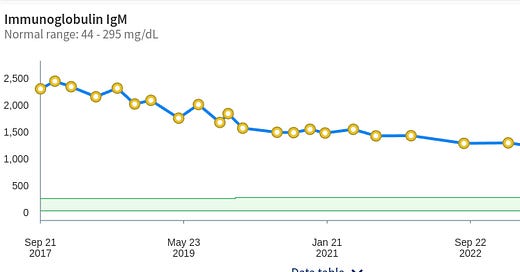This piece has nothing to do with solving the Gordian Knot. But it may have some important implications for our health care, and I have no other way of getting this to the search engines. I beg the choir's indulgence for this digression.
In 2017, I was diagnosed with Waldenstrom. Waldenstrom is a blood cancer which produces way too much Immunoglobulin M (IgM). IgM is an antibody, which is the body's first line of defense against infections. But if the body makes too much of it, the IgM crowds out other components of the blood, leading to anemia. It also makes the blood far too viscous, which can cause all sort of problems including loss of eyesight when the blood can't make it through the tiny veins in the eye. That's how my Waldenstrom was diagnosed.
Waldenstrom is rare. About 3 cases in a million each year in the US. Nobody knows what causes it. My own theory is superior genes. It is currently incurable; but it is treatable. Several drugs have been developed that screw up BTK signaling. BTK is an enzyme which pays a key role in the production of IgM. The cool thing is these drugs can be taken in pill form. No sitting in a chair for hours with a needle stuck in your arm. There are side effects; but, given the alternative, they have to be accepted.
In this case, the drugs are working. Figure 1 shows my IgM numbers since getting out of the hospital. Cardiologists and oncologists compete with each other to see who can avoid killing the patient first. Seven years in, I expect I will go down as a win for the oncologists.
Figure 1. Jack's IgM numbers. Less is good. Anything below 3000 is tolerable.
There is one problem. The drugs are outrageously expensive. I'm on Medicare with a standard Part D insurance. After I've run through the deductible and the donut hole, which I do in January, they cost me about $825 per month. I'm paying 5% the list price, which is about $198,000 per year.
I've been told the cost to the Federal government (aka tax payers) is more like five times what I'm paying, rather than close to 20 times. I have not been able to confirm that. So the cost to the taxpayer for my drugs is somewhere between $50,000 per year and nearly $200,000 per year. Let's optimistically assume that society (the taxpayer, my insurance company, and I) are paying the drug company "only" $60,000 per year.
The way drug trials work, Phase 1 determines the maximum dose we can tolerate with acceptable side effects. Then Phase 2 and 3 determine how effective the drug is at that dose rate. For successful drugs, the process generally stops there. There is no real attempt to determine if the optimal dose is less than the maximum tolerance dose. Why would a drug company spend money on testing that can only reduce its revenue?
For my drug the recommended dose is 4 pills per day. Last December my doctor and I became worried about the side effects. We decided to see what would happen if I cut the dose to 2 pills per day, a savings to society of at least $30,000 per year. My IgM numbers, which had been flat on the old dose, dropped slightly. So I cut the dose in half again. Six months in my IgM numbers have dropped again, Figure 2.
I've cut the cost to society by a factor of four and have better numbers. I've also significantly reduced any side effects. It is clear that for me, even forgetting about the crushing cost of the drug, the optimal dose is a lot less than the recommended dose.
Given the way drug trials works, it is reasonable to expect that my case is not an outlier. At least, for slow-moving (aka indolent) diseases such as Waldenstrom, it makes all kinds of sense for the doctor/patient to play around with the dose, especially for very expensive drugs. The goal is to find the dose which best balances health and cost. And perhaps drug companies should be required to spend some of their advertising budget on Phase 4 trials to determine optimal dose.






Thanks for sharing, Jack. Not at all irrelevant to undrlying Knot issues. In a way, this is sort of a contrapositive example of LNT nonsense. Sorry you're having to deal with this and spend so much, but glad it's effective!
Jack, thank you for sharing this.
George is also deciding about an experimental drug.
As David Butz said, I am sorry you have to deal with this, but glad the drug is effective!
Warmest wishes,
Meredith